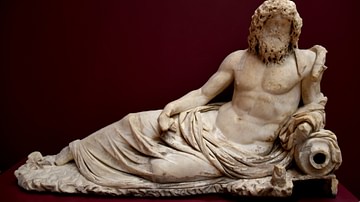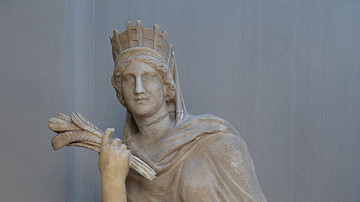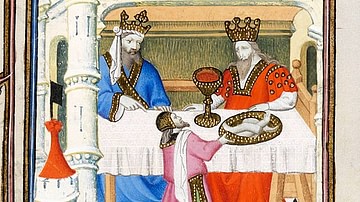Search
Search Results

Image
Oil Bottle with Tragic Mask
Red-figured squat lekythos (oil-bottle) with a tragic mask (perhaps Electra's) and a stage.
Made in Lucania, Italy, c. 360-320 BCE.
British Museum, London.

Definition
Zeus
Zeus was the king of the 12 Olympian gods and the supreme god in Greek religion. Zeus is often referred to as the Father, as the god of thunder, and the 'cloud-gatherer'. Zeus controlled the weather and offered signs and omens. Zeus generally...

Definition
Agamemnon (Person)
Agamemnon was the legendary king of Mycenae and leader of the Greek army in the Trojan War of Homer's Illiad. Agamemnon is a great warrior but also a selfish ruler who famously upset his invincible champion Achilles, a feud that prolonged...

Definition
Roman Sculpture
Roman sculpture blended the idealised perfection of Classical Greek sculpture with a greater aspiration for realism. It also absorbed artistic preferences and styles from the East to create images in stone and bronze which rank among the...

Definition
Theogony
The Theogony is an 8th-century BCE didactic and instructional poem, credited to the Greek poet Hesiod. The Theogony was, at first, not actually written down, rather, it was part of a rich oral tradition which only achieved written form decades...

Definition
Oceanus
Oceanus (also Okeanos) was the eldest of the Titans and a son of Uranus (Heaven) and Gaia (Earth) in Greek mythology. He was the god and personification of the freshwater river Oceanus, which was thought to encircle the earth and was said...

Definition
Tyche
In Greek mythology, Tyche is the goddess and personification of good luck, chance, and fortune. Tyche's popularity grew after the Classical period when many cities and officials across the Greek world and the Mediterranean adopted her as...

Definition
Atreus
Atreus was the mythical Greek king of Mycenae. He is perhaps best known for being the father of Agamemnon and Menelaus, two heroes of the Trojan War, as well as for the terrible curse placed upon his family. This was a hereditary curse, plaguing...

Definition
Philoctetes
The play Philoctetes was written by one of the greatest of the Greek tragedy playwrights, Sophocles, in 409 BCE. Philoctetes is one of his surviving plays whose exact production date can be determined and is set in the final year of the Trojan...

Definition
Matariki
The Maori people of Aotearoa (New Zealand) have long observed the heliacal (pre-dawn) rising of the star cluster commonly known throughout the world as Pleiades or Messier 45 (M45), located in the constellation of Taurus. Matariki is the...